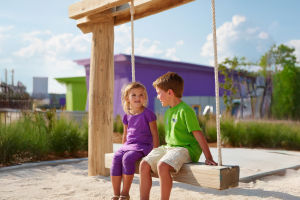Ever asked your phone for life advice… and wished a real person would just answer?
Not a influencer. Not a therapist. Just someone who's lived long enough to know that most problems don't need fixing—just time, and a good cup of tea.
That's exactly what more young people are seeking. Not through apps or algorithms, but through real, one-on-one friendships with older generations.
That's exactly what more young minds are seeking. Not through apps or algorithms, but through real, one-on-one friendships with elders.
And in return, they're getting something rare: calm. Perspective. A voice that says, "I've been there," without urgency or judgment.
Why Young People Are Embracing Older Generations
It's not that peers have become irrelevant. It's that they're often caught in the same storm.
When everyone around you is stressed about jobs, relationships, or feeling "behind," it's hard to gain distance. Group chats buzz with anxiety. Social media amplifies comparison. Even therapy, while valuable, is structured and time-limited.
But a 68-year-old retired teacher? She's not trying to impress anyone. She's seen recessions, breakups, identity crises—and she's still here, gardening, laughing, making soup.
"I started having coffee with Margaret after my mom passed," says Elias, 27. "We don't talk about her. We talk about birds, bread recipes, how rain sounds different in spring. It doesn't fix my grief. But it makes space for it."
This isn't therapy. It's companionship with context.
How These Friendships Actually Happen
They don't usually start with "Will you be my older friend?"
Instead, they grow through shared spaces:
• In community gardens, a young person plants seeds—and discovers life lessons from the neighbor beside them.
• Local libraries, hosting "Story & Tea" events where elders read short memoirs and stay for chat
• Intergenerational housing, where younger tenants offer light help (grocery runs, tech support) in exchange for rent discounts—and conversation
• Friendship apps like Togetherly and Sidekick, which match younger and elders for monthly meetups
One program in Dublin pairs volunteers aged 22–30 with isolated seniors for weekly walks. No agenda. No tasks. Just walking and talking. "We started with weather," says Lea, 25. "Now we talk about fear, love, what we want to leave behind. She calls me her ‘little mirror.' I call her my ‘future self.'"
What Young People Are Learning
Sometimes life’s most meaningful lessons aren’t grand declarations but small, enduring truths shared in everyday moments:
You don’t have to have all the answers right now.
Most worries lose their grip within six months.
Joy often lives in simple routines—like a cup of tea at 4 p.m. or sitting on the same park bench every Tuesday.
You can deeply love someone and still find the strength to let them go.
These aren’t catchy quotes meant for social media; they are whispered in kitchens, on park benches, and during quiet moments when time slows down.
Intergenerational relationships play a vital role in emotional well-being for both younger and older generations. Olders often provide a unique form of emotional support characterized by patience, understanding, and reflection rather than active life-building. This emotional spaciousness creates a comforting environment that allows younger people to feel more relaxed and supported as they navigate their lives.
Research shows that frequent positive interactions between generations contribute significantly to lower levels of anxiety and higher life satisfaction among younger individuals. These supportive bonds can act as emotional buffers, helping people manage stress and find balance in their daily lives. For older individuals, close and meaningful relationships with younger family members or friends can enhance feelings of purpose and reduce the risk of depression.
Mutual support within families and communities strengthens psychological health across age groups, highlighting the deep importance of nurturing intergenerational connections for overall well-being and happiness.
How to Build a Cross-Age Friendship (Without It Feeling Awkward)
It doesn't require a formal program. Start small and natural:
1. Visit local community hubs – Libraries, bookshops, farmers' markets. Smile. Chat. Return.
2. Ask open-ended, low-pressure questions – "What's your favorite thing about this neighborhood?" or "Have you always lived here?"
3. Offer small help – Carry a bag, fix a phone issue, water plants. Let kindness open the door.
4. Suggest a repeat – "I'd love to hear more about that. Could I join you next time?"
5. Be consistent, not intense – One coffee a month means more than three rushed calls in a week.
The key? Show up not to "save" or "learn," but to be together.
Maybe the Best Advice Doesn't Come From Your Peers
We've been told to "find your people"—and we have. But what if "our people" aren't just our age group?
What if wisdom doesn't come from hustle, but from stillness?
What if the person who helps you through heartbreak isn't someone who's also healing—but someone who remembers how it closed, slowly, like a door in the wind?
Next time you feel lost, don't just scroll. Don't just call a friend who's just as unsure.
Look up.
Look across generations.
Find someone who's no longer in a hurry.
And let them remind you:
You don't have to figure it all out today. You just have to keep walking—and sometimes, it helps to have someone older beside you,moving at the same quiet pace.


